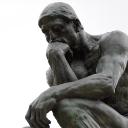Yahoo Answers is shutting down on May 4th, 2021 (Eastern Time) and beginning April 20th, 2021 (Eastern Time) the Yahoo Answers website will be in read-only mode. There will be no changes to other Yahoo properties or services, or your Yahoo account. You can find more information about the Yahoo Answers shutdown and how to download your data on this help page.
Trending News
When did Jesus remove the Authority He gave St Peter in Mt 16:17-19?
When did Jesus remove this Authority directly from St Peter and his successors?
Mt 16:17-19 And Jesus answered him, "Blessed are you, Simon Bar-Jona! For flesh and blood has not revealed this to you, but my Father who is in heaven. 18 And I tell you, you are Peter, and on this rock I will build my church, and the powers of death shall not prevail against it. 19 I will give you the keys of the kingdom of heaven, and whatever you bind on earth shall be bound in heaven, and whatever you loose on earth shall be loosed in heaven."
AUTHORITY - Should the Bible be the final authority of Christianity or the Church? Well, Christ stated that the Church, not Scripture should be the final authority: "And if he shall neglect to hear them, tell it unto the Church: but if he neglect to hear the Church, let him be unto thee as an heathen man and a publican." (Matthew 18:17 ) Christ did not state to refer to or consult Scripture for disputes and correction. He said to go to the Church as It is the final authority in Christianity. In addition, St. Paul states that the Church, not Scripture is "THE pillar and ground of the truth." (1 Timothy 3:15) Since the Church alone is mentioned as the pillar of truth, then It alone has the right to discern the truth and interpret Scripture. For if individuals could correctly interpret Scripture, then all interpretations would be exactly the same as there can only be one Spiritual Truth for the plural of the word "truth" never appears in Scripture. The Church is Christ's bride (E
Continue; The Church is Christ's bride (Ephesians 5:29) and has "no spot, wrinkle or blemish" (Ephesians 5:27). Christ also stated that the gates of Hell will not prevail against His Church (Matthew 16:18) so how can the Church commit error? Individual clergy may commit sins, even popes commit sins because in the Church there are both "weeds and wheat" (Matthew 13:30).
Is there to be a visible "head" of the Church here on earth? Well, not all believers are to have the same authority or equality within the Church. Did the Apostles have the exact same authority amongst themselves. No, they did not. For it was St. Peter alone that was the "rock" upon which Christ established His Church (Matthew 16:18). And it was St. Peter alone that was given the task of "feeding" Christ's sheep (John 21:15-17 ). Scripture clearly points out St. Peter as Christ's representative on earth. Christ did not ask the other Eleven to feed and tend His sheep. If you read The Acts Of The Apostles, it
Continue; If you read The Acts Of The Apostles, it is clear that St. Peter leads the Apostles. Therefore, since the Apostles are to be replaced as they die (Acts 1:20-26), then it follows that whoever succeed(s) St. Peter is leader of the Church. There is only to be one shepherd of the Church (John 10:16). For the Apostles did not argue amongst themselves whether there was a "greatest" at all, but who amongst them was the greatest (Mark 9:34; Luke 9:46).
@Cactus12; What are you talking about? I understand the superior claim to authority that the Church of Rome has. Martin Luther, Henry VIII and Joseph Smith never met Christ in person but St Peter did, so there´s no argument there. Is the Bible the "pillar of truth" in the Christian religion? No. According to the Bible Itself, the Church is the "pillar of truth" (1 Timothy 3:15), not the Bible. Some "Bible" Christians insist that a "pillar" (the Church) was created to "hold up" another structure (the Bible). They claim the Bible is the structure being held up according to this passage. Well, if that is the case, how did the early Church "hold up" the Bible for the first three to four hundred years when the Bible Itself didn't even exist? Also, even if the Church is only a "pillar" holding up the Bible, doesn't that mean that the Church is the interpreter of Scripture rather than the individual?
"Ignorance of the Scriptures is ignorance of Christ." - St. Jerome (4th century A.D
16 Answers
- 『 』Lv 71 decade agoFavorite Answer
You need to be more specific for the fundies.
In other words, we need to break it down for people like Maurog III, so lets explain the succession of the Apostolic Authority within the Scriptures:
The authority of the Apostles did not die with them, and we know this when we look at: Beginning from the baptism of John, until the day wherein he was taken up from us, one of these must be made a witness with us of his resurrection. And they appointed two, Joseph, called Barsabas, who was surnamed Justus, and Matthias. [Acts 1:22-23] † And as they were ministering to the Lord, and fasting, the Holy Ghost said to them: Separate me Saul and Barnabas, for the work whereunto I have taken them. [Acts 13:2] † And then immediately the brethren sent away Paul, to go unto the sea; but Silas and Timothy remained there. And they that conducted Paul, brought him as far as Athens; and receiving a commandment from him to Silas and Timothy, that they should come to him with all speed, they departed. [Acts 17:14-15] † For the Son of God, Jesus Christ who was preached among you by us, by me, and Sylvanus, and Timothy, was not, It is and It is not, but, It is, was in him. [2 Corinthians 1:19] † Only Luke is with me. Take Mark, and bring him with thee: for he is profitable to me for the ministry. But Tychicus I have sent to Ephesus. [2 Timothy 4:11-12]
- BruceLv 71 decade ago
He never removed it; his authorization and promise is still in force after 2000 years. There is no other explanation for its survival for all that time against all the odds.
To recap:
1. He authorized an actual organization with a human leader, Peter, to safeguard his teachings and carry out his sacraments.
2. He made a promise that the gates of Hades would not prevail against this organization. That means divine intervention against the powers and influence of rebellious angels.
3. He gave Peter, working for consensus within the church, agency to make decisions that would be honored in heaven.
4. The powers to "bind and loose" can be interpreted to include apostolic succession (without which the church would die after the first generation or fall into heresy), forgiveness of sins (John 20:23: "If you forgive anyone’s sins, their sins are forgiven; if you do not forgive them, they are not forgiven”), and interpretation of Jesus' teachings.
On this last power, without the power to interpret, the church could not retain relevance or authority in response to the changing moral challenges we face through history. For example, we would have nothing to say about birth control pills, in vitro fertilization, or cloning if we were restricted to first-century statements.
Cheers,
Bruce
- Mike KLv 71 decade ago
Hello,
Well Luther, Calvin and the lot came along and run them off starting in 1517. Henry VIII at first defended the Catholic Church brilliantly in his Defence of The Seven Sacraments but pulled out and took his business elsewhere, also skidding Peter and his successors when he was not granted his annulment.
Cheers,
Michael Kelly
- AcornLv 71 decade ago
An interesting irony to me is that many of the Christians who say you have to read Holy Scripture as literal and infallible, use tortured logic to explain away this particular passage. They do the same with Mat 26:26 and Luke 22:19, where Christ instructed us to eat His body (not a symbol of His body) to have eternal life.
- How do you think about the answers? You can sign in to vote the answer.
- lyn1136Lv 71 decade ago
The successors to Peter are a given with this phrase, "This is My Body and This is My Blood OF THE NEW AND ETERNAL TESTAMENT...." An "eternal testament" does not quit with one appointee, it continues from valid successor to valid successor, qualified to be "of the faith," and qualified to intend to hold that faith. It is a structure, and Christ gives the formula to those who see it plainly written there.
That is the entire, larger picture, the snippet of scripture tells us, and the Doctors of the Church define. "I give thee, Peter, the Keys to the Kingdom, and whatsoever thou shalt bind upon earth, it shall be bound in heaven;...etc.," That is the Church which Christ left for us. He never mentioned the word "bible."
BUT, YOU MISSED THE PART WHERE CHRIST DID REMOVE PETER'S AUTHORITY, and, yes, it is in the official Vulgate and Douay!!! Christ describes His coming Passion, Suffering and Death, which Peter finds fearsome and despicable for so "holy a Man as his Lord and God." He replies to Our Lord, saying: "Lord, be it far from thee; this shall not happen to Thee. Who (Jesus) turning, said to Peter: Go behind me, Satan, (to Peter) thou art a scandal unto Me, because thou savourest not the things that are of God, but the things that are of men." PETER LOST HIS POSITION THROUGH HIS OWN DENIAL OF THE CRUCIFIXION TO COME. Matt 16: 20-ff. Douay AND KJV. [Yes, a pope lost his faith.]
But we know Peter was greatly sorry for this blasphemy, and Christ restored Peter once again when He revealed to Peter, James, and John His TRANSFIGURED HEAVENLY CHRIST, in all His glory. Yet, Peter answered once again for the Apostles, "Let us make 3 tabenacles one for thee, one for Moses and one for El;ias." The Apostles yet did not understand about Christ's Divine and Human natures which He is as LOGOS:, meaning He is God, and He is Man, both, not combined natures, but separate, the Mystery of Faith.
There is so much in the bible, that St. John is right. The world is not large enough to contain all the books, if it was all written, of all the things Christ said.
Traditional Catholics at
traditionalmass.org/
- ?Lv 51 decade ago
Peter was given the keys and then he gave them to the church. Just as a password to get into your computer is only yours as long as you don't give it to anyone else.
If was never intended that Peter should keep the keys.
Act 2:36 Therefore let all the house of Israel know assuredly, that God hath made that same Jesus, whom ye have crucified, both Lord and Christ.
Act 2:37 Now when they heard this, they were pricked in their heart, and said unto Peter and to the rest of the apostles, Men and brethren, what shall we do?
Act 2:38 Then Peter said unto them, Repent, and be baptized every one of you in the name of Jesus Christ for the remission of sins, and ye shall receive the gift of the Holy Ghost.
There they are, the more people that have the keys, the more that can enter into the kingdom.
Source(s): Rom 3:4 - goodluckwithhatLv 71 decade ago
Sometime around the mid 16th century--when Protestants claimed he never gave it to him in the first place. I'm surprised they didn't take THAT out of the bible too!
- By FaithLv 71 decade ago
The church was established by the Lord Jesus Christ. He said, "I will build my church" (Mt. 16:18). It is His institution, and He is not only the Founder and Builder, but the Foundation and Chief corner stone (1 Co. 3:11; 1 Pe. 2:6). The Lord Jesus Christ chose twelve men as His Apostles, and it was through these Apostles that He established the first churches and laid the doctrinal foundation for all future churches. Ep. 2:20 tells us that the Apostles formed the foundation for the church, not merely Peter. "For through him we both have access by one Spirit unto the Father... and are built upon the foundation of the APOSTLES and prophets, Jesus Christ himself being the chief corner stone" (Ep. 2:18,20). If a church does not have Jesus Christ as its Founder and Foundation, the Apostles as its teachers, and the N.T. churches as its model, it is not a true church.
In Matthew 16:18 Jesus says to Peter, "And I say also unto thee, That thou art Peter, and upon this rock I will build my church; and the gates of hell shall not prevail against it." According to the Catholic Church, this is where Jesus appointed Peter to be the first Pope, the earthly head of the church. That is, the Catholics teach that "this rock" is a reference to Peter. The Scriptures are quite clear in stating that the Rock is Jesus Christ and no one else. In fact, Peter himself testifies of this truth when he calls Jesus the "chief cornerstone" in I Peter 2:6. Paul tells us in I Corinthians 3:11 that Jesus Christ is the "foundation". He then says in I Corinthians 10:4 that Jesus Christ is the "Rock". The reader might also give some consideration to the words of Moses in Deuteronomy 32:29-31. Jesus Christ is the foundation (I Cor. 3:11), the perfect match for the "rock" ("petra") of Matthew 16:18. Christ is clearly the Rock in Scripture (II Sam. 22:32; Psa. 40:2; 42:9; 89:26; 92:15; 94:22; Acts 4:11-12).
- skeptikLv 71 decade ago
If Peter was named as the highest authority in the new church, why did Paul win all their arguments?
Christianity by the late first century had become the church of Paul, not the church of Peter. If as you say the Church is the final authority, then this fact in itself proves that Peter's grant of authority was essentially meaningless.
- Dear DogmaLv 71 decade ago
The power to bind and loose has been given to the church, if it hasn't, by what authority was the canon formalized?







